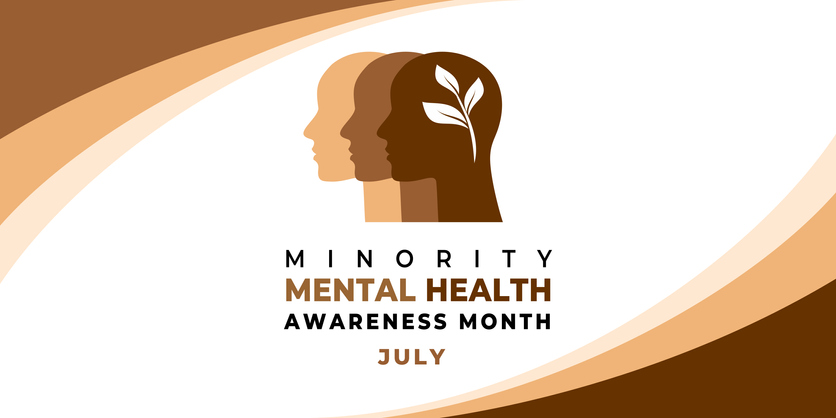Answering the Call for Minority Mental Health Awareness
Posted by Total Pharmacy Supply on Jul 5th 2023

July is National Minority Mental Health Awareness Month, an important time for pharmacists and healthcare professionals to take a closer look at how minority populations experience mental health. With the growing need for improved health outcomes among those struggling with mental illness — especially within marginalized communities — it’s essential that we take initiative to bridge gaps between accessible services and underserved populations.
That means much more than simply offering prescriptions; as healthcare professionals, our goal is to empower individuals of diverse backgrounds by connecting them with the resources they need in ways that are culturally competent and tailored to their needs. By arming ourselves with knowledge about how best to support these communities through things like outreach programs, proactive advocacy efforts, and evidence-informed practices, we can better address some of the most pressing disparities affecting minority mental health today.
Bebe Moore Campbell National Minority Mental Health Month
In 2008, July was designated as the Bebe Moore Campbell National Minority Mental Health Awareness Month by the U.S. House of Representatives. Bebe Moore Campbell was an author, who used her words in books including, “The 72-Hour Hold” and “Sometimes My Mommy Gets Angry,” to address the profound impact of racism, mental health and the enduring strength of culture, community and connections. In 2005, inspired by Campbell’s charge to end stigma and provide mental health information, her longtime friend, Linda Wharton-Boyd, suggested dedicating a month to the effort. In November 2006, Campbell lost her battle to cancer. Wharton-Boyd, friends, family and allied advocates reignited their cause, inspired by the passion of an extraordinary woman.
Examining the Disparities in Mental Health Care for Communities of Color
Mental health disparities between racial and ethnic groups have existed for many years, with research showing that minority populations are less likely to receive adequate mental health care. This is due in part to a lack of access to services, but also often because of cultural barriers or stigma among the communities most affected. For example, there’s evidence that African Americans are more likely to be diagnosed with mental illness and are often undertreated due to distrust of healthcare professionals. Additionally, Latinos may experience a language barrier that prevents them from seeking the help they need or even understanding the warning signs of mental health issues.
Some other important factors and statistics to note include:
- Several studies showed that people from racial and ethnic minority groups were more likely to receive a schizophrenia diagnosis than White people. These findings are especially pronounced for Black Americans.
- Black Americans with mental illness are more likely to be hospitalized than any other racial group.
- People from racial and ethnic minority groups receive higher doses of antipsychotics and often are prescribed second-generation antipsychotics.
For further information, check out these articles:
- https://healthcare.rti.org/insights/racial-disparities-in-serious-mental-illness
- https://www.mhanational.org/issues/black-and-african-american-communities-and-mental-health
- https://www.kff.org/racial-equity-and-health-policy/issue-brief/five-key-findings-on-mental-health-and-substance-use-disorders-by-race-ethnicity
- https://www.psychiatry.org/psychiatrists/diversity/education/mental-health-facts
- https://minorityhealth.hhs.gov/omh/browse.aspx?lvl=4&lvlid=24
The Role of Pharmacists in Minority Mental Health Awareness
Pharmacists can help to bridge the gap by serving as advocates and educators for minority mental health. By actively engaging with communities of color, pharmacists can emphasize the importance of seeking treatment, discuss cultural stigmas around mental illness, provide resources and overall support to those affected.
Pharmacists need to be aware of any cultural, language or other barriers that could prevent a patient from seeking out appropriate mental health care. They should also understand how race, ethnicity, culture and language can all affect a person’s experience with mental illness.
Through increased awareness and sensitivity to mental health disparities within minority populations, pharmacists can make a huge difference in the lives of those who need it most. It is essential that we continue to work towards improved access and quality of care for underserved communities — so all individuals have the opportunity to live their best life.
How to Talk About Mental Health With Patients From Different Cultural Backgrounds
When talking to patients from different cultural backgrounds about mental health, it is important to be aware of the language and cultural norms surrounding the conversation. Be sure to use open-ended questions such as “What do you think about…?” or “How can I help?” rather than making assumptions.
Providing resources in a variety of languages is another important aspect of reaching minority populations. For example, leaflets or other information about mental health services should be available in Spanish, if possible. Additionally, it is important to consider the patient’s age and level of education when determining the best way to present information and resources.
It is also important to recognize that many minority communities may have limited access to healthcare services due to structural racism or other socio-economic factors. It can be helpful to provide information about local mental health services that are affordable and accessible for those in need.
Finally, it is important to recognize that many minority populations are more likely to experience stigma surrounding mental health issues. It can be beneficial to offer a non-judgmental and supportive atmosphere while talking about mental health, as well as provide information on common symptoms of mental illness and how best to get help. By providing accessible and tailored resources to minority populations, pharmacists can help break down the stigma and ensure that everyone has access to the care they need.
—
This July, let’s honor Bebe Moore Campbell by continuing her legacy of raising awareness about mental health disparities in communities of color and supporting those who are affected. Let’s also strive to make sure all individuals have access to quality care and resources — no matter their race, ethnicity or background. The role of pharmacists in mental health awareness is critical. Pharmacists have the power to make a difference in the lives of those who are living with mental illness and can help bridge the gap between minority populations and quality care. By educating themselves on cultural norms and providing tailored resources, pharmacists can provide a better environment for all patients.
